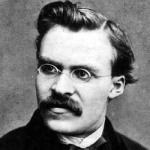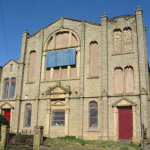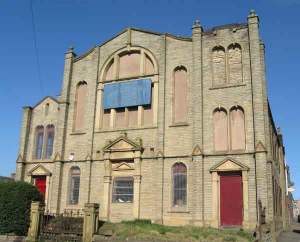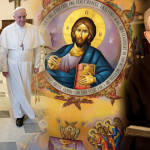Deprecated: trim(): Passing null to parameter #1 ($string) of type string is deprecated in
/home/aoiusa/public_html/wp-content/plugins/sexybookmarks/public.php on line
388
Deprecated: trim(): Passing null to parameter #1 ($string) of type string is deprecated in
/home/aoiusa/public_html/wp-content/plugins/sexybookmarks/public.php on line
394
Deprecated: trim(): Passing null to parameter #1 ($string) of type string is deprecated in
/home/aoiusa/public_html/wp-content/plugins/sexybookmarks/public.php on line
400
Source: The Catholic World Report | Christopher B. Warner
The April 22nd kidnapping of Syrian archbishops Mar Gregorios Ibrahim of the Syriac Orthodox Church and Paul Yazigi of the Greek Orthodox Church of Antioch, and the killing of their driver, has reminded us once again of the vulnerability of ancient Christian peoples living in the Middle East. More than 1,000 Christians have been killed to date in the Syrian conflict and more than 80 churches have been destroyed. The majority of Christians in Syria are Greek or Syriac Orthodox or Melkite Greek Catholic. This recent violence in Syria can remind us to pray for suffering Christians in the Middle East and afford us the opportunity to practice solidarity with our Greek Catholic and Orthodox Christian brothers and sisters.
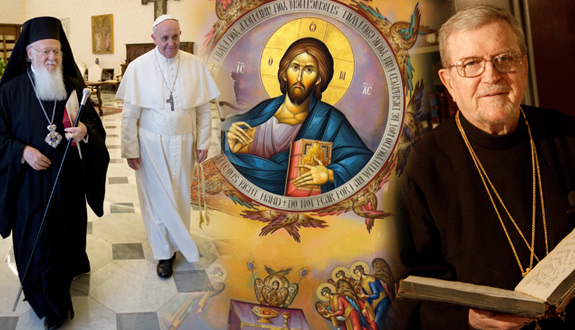
Catholic World Report had the recent privilege of asking Archimandrite Robert Taft, SJ for his perspective on current Orthodox-Catholic relations. Father Taft has been the leading scholar in Byzantine liturgical studies for decades. Taft has devoted his life to preserving the liturgical treasury of the East and building bridges between Orthodox and Catholic Christians. As a young Jesuit, Taft first became interested in the liturgical traditions of the Christian East while teaching at the Baghdad Jesuit College in Iraq (1956-1959).
In 1963, Taft was ordained a Catholic priest of the Byzantine Slavonic (Russian) Rite. He is Professor-emeritus of Oriental Liturgy at the Pontifical Oriental Institute, Rome, where he received his doctorate in 1970 and remained to teach for 38 years. The Oriental Institute is the most prestigious institute in the world for Eastern Christian studies.
A prolific writer, his bibliography comprises more than 800 articles and 26 books, including A History of the Liturgy of St. John Chrysostom (vols. II-VI), Orientalia Christiana Analecta, Rome, 1978-2013. Several of his writings have been translated into other languages.
Taft is the personal friend of many prominent Orthodox scholars, living and deceased, like Father Alexander Schmemann and Father John Meyendorff. He has many friends in and ties to the Russian Orthodox community, where he is admired and respected. For example, he directed the doctoral studies for both of St. Vladimir Seminary’s liturgical professors: Paul Meyendorff and Father Alexander Rentel.
CWR: Father Robert, thank you very much for your willingness to share with us some of your recent thoughts on Eastern Christian ecumenism.
Many people who are sensitive to Orthodox-Catholic dialogue noticed that when Pope Francis appeared on the balcony a month ago, he was not only very humble, but spoke of the Church of Rome as the Church “which presides in love” and referred to himself as the bishop of Rome concerned for the Christians of Rome. These past few weeks he has definitely set the tone for his pontificate.
This quotation from the second-century letter of St. Ignatius of Antioch to the Roman Church, “which presides in love,” could not have been coincidence considering Pope Francis’ noteworthy sensitivities to Eastern Christian ecclesiology. Plus, the historically unprecedented response to Francis’ election in the form of Ecumenical Patriarch Bartholomew’s attendance at the papal installation Mass seems to mark Pope Francis as another welcomed bridge-builder between East and West. As an aside, I think it is beautiful that pontifex means “bridge-builder” in Latin. Perhaps Pope Francis will bring a new understanding of that title through his ecumenical dialogue and his local focus on the duties of the bishop of Rome? Could you comment on how you think Pope Francis’ humble “style” will be viewed by Orthodox Christians?
Taft: Pope Francesco is making a wonderful impression on most of the world by just being himself, the self of a real Christian in love, not with himself or his image, but with what real Christians love…God and all His creatures He died to save, especially the poor and needy and downtrodden. This has come across clearly to all of us, including Orthodox I know, who as real Christians can spot a fellow-Christian a mile away.
In addition, even more interesting from the ecumenical perspective is Francesco’s emphasis on his primary title, “Bishop of Rome.” Because a prelate’s title to his primacy comes from his local primatial see, not from some personal or super-imposed ecclesiological distinction. I can’t imagine that any of our attentive Orthodox observers have missed that!
CWR: Most Catholics probably envision future unity between the Orthodox Churches and the Catholic Church as a re-installment of one world Church organization with the pope of Rome at the top of the governing pyramid. A look at history shows that such a model never existed, so what could Orthodox-Catholic communion actually look like if it were achieved? A renewal of Eucharistic communion? The possibility of an eighth ecumenical council? A resolution for the dating of Pascha/Easter?
Taft: What it would look like is not a “reunion” with them “returning to Rome,” to which they never belonged anyway; nor us being incorporated by them, since we are all ancient apostolic “Sister Churches” with a valid episcopate and priesthood and the full panoply of sacraments needed to minister salvation to our respective faithful, as is proclaimed in the renewed Catholic ecclesiology since Vatican II and enshrined in numerous papal documents from Paul VI on, as well as in the wonderful Catechism of the Catholic Church. So we just need to restore our broken communion and the rest of the problems you mention can be addressed one by one and resolved by common accord.
CWR: According to the most recent joint statement of the North American Orthodox-Catholic Theological Consultation (2010), future communion would include several key elements:
Mutual recognition: The numerous Orthodox Churches and the Catholic Church would have to “explicitly recognize each other as authentic embodiments of the one Church of Christ, founded on the apostles”;
A common confession of faith: The “Filioque” ought to be dropped in order to reflect the common Confession of Faith “canonized at the Council of Constantinople in 381”;
Accepted diversity: Orthodox-Catholic Christians would “live in full ecclesial communion with each other without requiring any of the parts to forego its own traditions and practices”;
Liturgical sharing: “Members of all the Churches in communion would be able to receive the sacraments in the other Churches”;
Synodality/conciliarity: “Bishops of all the Churches would be invited to participate fully in any ecumenical councils that might be summoned.
Synodality would operate at various levels of ecclesial institutions: local, regional, and worldwide”;
Mission: “As sister Churches, they would also engage in common efforts to promote the realization of a Christian moral vision in the world”;
Subsidiarity: “Those elected to major episcopal or primatial offices would present themselves to other Church leaders at their level”;
Renewal and reform. They would “commit themselves to continuing [Christian] renewal and growth—together.”
The statement goes on to say, “Conscience holds us back from celebrating our unity as complete in sacramental terms, until it is complete in faith, Church structure, and common action.” Can you clarify what you mean by “restoring our broken communion” so that the other existing problems “can be addressed one by one and resolved by common accord”? It seems like we already have “mutual recognition,” “accepted diversity,” and “mission”; what is the next step and how many steps will it take before we get to “liturgical sharing” which is what I think of when you say “broken communion?”
Taft: Yes, much that is put forward in this excellent historic document is already a reality or on the way to being so. For instance there is no “Filioque” in the Creed Russian Catholics chant in our Slavonic liturgy, and some years ago Rome issued a clarification of its Trinitarian belief about which the late French Orthodox theologian Olivier Clément said if that is the Catholic teaching on the issue then the problem has been resolved. As for “ecumenical councils,” the Catholic Church might specify more clearly its list of those, which as far as I know we have never defined. Are the purely Roman Catholic post-schism councils to be considered ecumenical councils of the undivided Church? If so, says who?
CWR: How could the papal claims of Rome be modified in a way that would be both acceptable to the Orthodox Churches and faithful to the tradition of the Catholic Church? Do you think the jurisdiction issue really is a hang-up for the Orthodox since they also practice cross-jurisdiction throughout Western Europe, the Americas, Australia, and East Asia?
Taft: The new Catholic “Sister Churches” ecclesiology describes not only how the Catholic Church views the Orthodox Churches. It also represents a startling revolution in how the Catholic Church views itself: we are no longer the only kid on the block, the whole Church of Christ, but one Sister Church among others. Previously, the Catholic Church saw itself as the original one and only true Church of Christ from which all other Christians had separated for one reason or another in the course of history, and Catholics held, simplistically, that the solution to divided Christendom consisted in all other Christians returning to Rome’s maternal bosom.
Vatican II, with an assist from those Council Fathers with a less naïve Disney-World view of their own Church’s past, managed to put aside this historically ludicrous, self-centered, self-congratulatory perception of reality. In doing so they had a strong assist from the Council Fathers of the Melkite Greek Catholic Church whose concrete experience of the realities of the Christian East made them spokesmen and defenders of that reality.
In this context I would recommend the excellent new book by Robert Louis Wilken, The First Thousand Years: A Global History of Christianity (New Haven & London: Yale U. Press 2012). Professor Wilken, a convert to Catholicism who is a recognized expert on Early Christianity and its history and literature, shows that Early Christianity developed not out of some Roman cradle but as a federation of local Churches, Western and Eastern, each one under the authority of a chief hierarch who would come to be called Archbishop, Pope, Patriarch, or Catholicos, each with its own independent governing synod and polity, all of them initially in communion with one another until the vicissitudes of history led to lasting divisions.
CWR: Many Orthodox theologians claim that even if the Ecumenical Patriarch of Constantinople or the Patriarch of Moscow were to unite with Rome tomorrow, the lay faithful and the monastics would probably not accept it and therefore there would be no actual union. Given the history of Lyons and Florence do you think this is true, or has the Orthodox mood changed recently?
Taft: Part of the problem is that some Orthodox do not instruct their people adequately and update them, so ecumenical progress on the upper level often does not filter down to the ordinary faithful. In addition of course, there is the problem of the bigotry of many of the monastics and others towards anyone who is not Orthodox. On how they square this with what Christianity is supposed to be according to Jesus’ explicit teaching in the New Testament, we still await their explanation. One Catholic remedy for this—its usefulness proven by the rage it provokes in the exposed bigots—is the factual diffusion of their views, objectively and without editorial comment, in publications like Irénikon in French, or in English Father Ronald Roberson’s highly informative monthly SEIA Newsletter on the Eastern Churches and Ecumenism, distributed gratis to subscribers via email and eventually preserved for permanent reference in the Eastern Churches Journal. These publications just give the news without comment, including quotations from the bigots permanently recorded for posterity, thereby exposing them to the public embarrassment they merit. This is especially important for some representatives of Orthodoxy who speak out of both sides of their mouth, saying one thing at international ecumenical venues, and quite another for the consumption of Orthodox audiences or in publications they do not expect the non-Orthodox to read.
CWR: You mentioned the fact that documenting statements from Orthodox representatives has the potential to nail down the real arguments and eradicate equivocation. How has modern technology, especially the Internet, helped (or hindered) ecumenical dialogue?
Taft: Anything that helps spread the news and the flood of ever-new documentation on inter-church relations can only be viewed positively. And it is a mistake to think that this is not true in countries of the less-developed so-called “third world,” where those interested in the rest of the world are often more computer-literate than those of us in the West. Some of my Orthodox friends in far away countries are computer whizzes compared to me!
CWR: It seems as though Western Catholic theologians have been interested in Eastern theology for the past 1,500 years and have generally sought to integrate it into their own theology. On the other hand, many modern Eastern Orthodox theologians are very leery about anything Western and have furthermore severed themselves from their roots in Hellenic philosophy. Is this statement accurate? Is this a recent phenomenon? And are there any schools of Eastern Orthodox theology that do not see the integration of Western theology and philosophical inquiry as a threat to Eastern theology?
Taft: First of all, the roots of ALL of us include a Neo-Platonic heritage that no one has abandoned in East or West since it is part of Christianity’s DNA, so drop that notion. As for Orthodox theologians, we must distinguish the second-stringers from the best ones. Lest my list be endless, let me mention just a few in each Orthodox Church who are fully conversant with present western Catholic theology. Among the Greeks: Metropolitans Kallistos Ware and Ioannes Zizioulas, Archpriest Stefanos Alexopoulos, Prof. Pantelas Kalaitzidis of Volos, and the professors of Holy Cross Hellenic Greek College in Brighton, Massachusetts. Among the Russian Orthodox: Metropolitan Ilarion Alfayev, Sr. Dr. Vassa Larin, Protoierej Mixail Zheltov, and numerous others. Then in the USA we have the Professors of St. Vladimir’s Orthodox Seminary of the OCA, and on and on. So there are in fact plenty of top Orthodox theologians au courant in modern non-Orthodox theological thought.
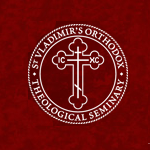
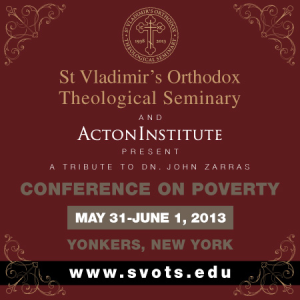 St. Vladimir’s Conference on Poverty, May 31-June 1, 2013
St. Vladimir’s Conference on Poverty, May 31-June 1, 2013